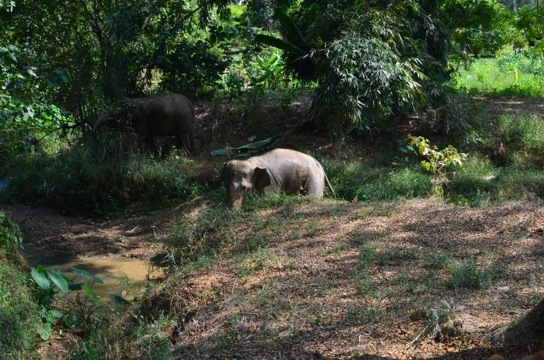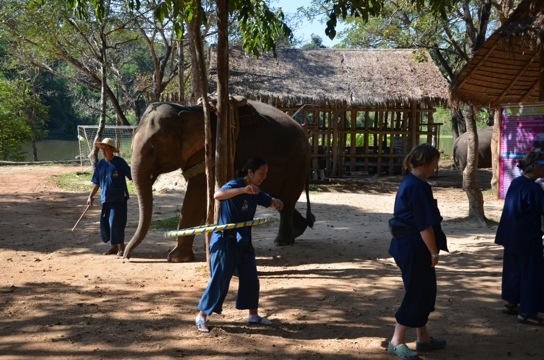The second day we walk out to the forest at 6.30 with the sun climbing the mountains behind the jungle. The couple mahouts that set out with us are jaunty, easy, and of course, tiny. Tiem, who is responsible for getting us in one piece to the jungle (if not back), is maybe 5′, whipcord thin, with calves as big as mine. He has a broad-toothed smile and sports an old English-style bamboo safari hat. Or did the English sport Thai-style hats?
I arrive with no mahout. Mountain, my elephant, is not down by the river, but at the very tip of her tether, on top of the mountain, rocking back and forth, head up and down, greeting me or the morning or the sugar cane with quiet enthusiasm. I stand, unsure without my blue-suited, stoic guide. She has no such problem. She rumbles like a dog growling, but as another mahout says, “happy, happy!”.
She cannot fathom why I would stand 5 paces away bearing such sweetness without giving it over. I think this has happened a lot in my life.
She has a friend, Pra-tu-ap, who meets us on the road. Her mahout is the second string rider, the main mahout off on family business until the next day. He does not ride like my mahout, but walks near the elephant, with a pinched face. Maybe he is tired or hung over, or afraid. There is an elephant game they play together with growling and fast trumpets. One passes the other on the narrow path, then turns sideways, swaying, tail swatting, trunk searching. The other passes in an unexpected surge of grey strength, like an unexpected undertow in the ocean. She turns, ears waggling, flapping our legs, growls like a deep giggle.
My mahout is saying, “mai, mai”, meaning “softly, softly”, and Sinkhón (Mountain) is gentle with us on her back. The other mahout says nothing, and spritely 18-year-old Pra-tu-ap dances and swings with Bacchanalian abandon. The other faráng (foreigner) rider is white-eyed in terror. She nearly falls. My mahout is speaking to the other mahout. He steps back. I raise my voice, gesturing as Pra-tu-ap dances in place. The mahout steps back further, looking away. My journey-mate is freaking out, is looking for places to fall, looking for a way to coax her jelly-legs to let her jump to the apparent safety of my elephant.
None of those things happens. My mahout, Boom, gets Sinkhón away from the other elephant, down the path, past the male in heat chained on the other side of the river, down to the show grounds, away. Crisis delayed.
I am standing nearby, useless, while Boom undoes the chain from Sinkhón’s leg, while he begins coiling the long chain of her night watch. “Sugar Cane. One.” he says, gesturing at the long maroon canes piled up in a stand nearby. I find the juiciest, fattest one. I yank it free. Sinkhón’s trunk is dancing in the air beside me. She snatches the cane, cracks it with her trunk, shoves the whole lengths of it into her mouth. Her great, invisible molars render it to pulp so juicy, sugar water runs down the pointed wattle of her chin.
I stand there, the chain undone, the mahout checking, coiling. The elephant stares at me and shakes her head toward the sugar cane. I am impassive. “One,” was quite clear from Boom.
Patiently, like my friend Bill with his severely challenged students, she taps my hand lightly with her trunk, then points at the sugar cane pile. She waits. I wait, looking her in the eye. Sighing, she swings her trunk back around and blows soft, clean air into my face. “Hey!” she seems to be saying.. “Wake up!” She taps my hand, “you. you can get.” she points at the cane again, bobbing her trunk, little finger-like end of the trunk curling, “Sugar cane. Hello!?”
And then “Bai, bai!” from the mahout, and they are off. The mahout raises his arm, looking at a watch neither of us owns or wears, “9 o’clock. Here. Practice.” He nods, with a partial smile, making sure I’m not too thick to understand.
They both know I’m a little thick and need pointers. “Okay,” I nod twice, almost-bowing.
“Okay,” he says back, turns away, “Okay.”
I stand near the sweetness watching great hearts recede. This, too, is familiar.

